and used for campfires.
Eagles:
Moccasin Creek was used for swimming on Day 2 and boys decided to swim there in future, leaving equipment there. They did so in spite of seeing snakes there, returning to it in preference to the (beautiful) reservoir. Signs naming Moccasin Creek and Copperhead Hil (across the stream) were put up on Day 4. Pictures of this area were exclusive subject of arts and crafts period, Day 5.
Campfire circle was re-named "0. U. Camp" on the first night, and a sign put up labeling it.
Attitudes toward other members of the in-group and persons important in the group's functioning were stabilized. This is particularly evident in the case of individuals whose behavior was for some reason prominent within the group. Some of these standardizations were temporary, while others were more enduring. An example of the latter is the nickname "Red" for Brown (Rattlers) which typified his coloring and probably his size and "toughness. " Among the Eagles, Myers, as noted briefly in the summary of interaction, engaged in considerable "show-off" behavior during the first days. At one time while preparing a fire, he spoke of himself with approval as "Smart Bob." Several boys echoed: "Dumb Bob! Crazy-mixed up Bob!" Such terms were used on occasion throughout this stage, although Myers began to make definite efforts to be accepted. A more enduring nickname for Myers was "Nudie, " given when he started swimming in the nude. At his suggestion the group occasionally referred to themselves with hilarity as RCNCI (Robbers Cave Nudist Colony, Inc.). Other temporary nicknames in the Eagle group were "Marilyn Monroe" or just "Marilyn" for a boy who gave a burlesque dance one night;
"Screwball, senior" and "Screwball, junior" for staff members.
Norms were standardized in both groups in relation to experiences and behavior which became important to the group. The "tough" norm among Rattlers was a notable example. At various times, Mills, Martin, Simpson and Harrison all carried [p. 93] on the rather strenuous activities with injuries (all of minor nature). The staff had to remember to check Martin's bruised knee and wrist because he never mentioned them. Harrison did not cry when he injured his hand, but did cry later when he found out that it would keep him from the catcher's position, and members sympathized with him. Swift did not conform to this tough norm, and was completely ignored when he cried. Along with the "tough" norm went a definite approval of cursing. "Toughness"
and cursing are both norms of conduct among groups in the larger social setting; they were not original to the Rattlers. However, these norms were not standardized among the Eagles. On the contrary, cursing was definitely discouraged in the Eagle group (see also Stage 2), and crying at injuries was indulged in even by Craig, the leader.
In the Eagle group, Davis and Boyd were ridiculed for about the last 3 days for being homesick.
A definite norm against being homesick was standardized, in relation to which these two were seen as deviant. Mason, who had on occasion talked longingly of home, showed no signs of wanting to go home in Stage 1 after the norm became established. Swimming in the nude was another norm which was stabilized in the Eagle group. This practice was not taken up by the Rattlers.
In both groups, methods of rotation or taking turns were standardized for saying grace at meals. These activities were initial y regulated verbally by high status members, but came in time to be self-regulating. In the Rattler group, Brown passed the duty around for 2 days; then it was rotated among low status members. When Mills attained a stable position as leader, he designated the person to say grace. From the 7th day, the order of saying grace was pre-determined by the group and followed without prompting.
During the early part of Stage 1 in the Eagle group, Davis usually told one of the boys to give thanks after he had figured out which one had not said grace as many times as the others.
When he lost track, he asked each of the boys to state how many times he had said it. When Davis became homesick, Craig took over the function for a short while, but soon quit trying to keep track of whose turn was next. Thereafter, thanks was done on a volunteer basis, the end result being the same: the boys rotated the duty among themselves.
[p. 94] Spontaneous games were standardized (probably not original) in both groups: waterball among Eagles with a special "hot potato" rule; dam climbing with definite rules governing order and maintenance of positions among the Rattlers, as well as a paper airplane game.
One group product which clearly signifies in-group delineation is naming the group. The name chosen by the Rattlers is hardly coincidental in view of the not infrequent sights and encounters with rattlesnakes, notably during their overnight campout. Significantly enough, the only other suggestion in the Eagle group for a name was "rattlesnake biters." Eagles adopted their name after becoming concerned about the other group in camp. (Myers asked if the other group had a name.)
Both groups had favored songs, the Eagles referring to one consistently as "our song."
In both groups during Stage 1, deviation from norms or decisions by the group led to being
"called down" or ignored. Myers was ignored by the Eagles when he refused to be "out" in baseball. When Swift did not live up to the "tough" norm, other Rattlers ignored him. Members were chastised verbally by others for not doing their share of work in both groups.
Reactions to the other group: When the in-group began to be clearly delineated, there was a tendency to consider al others as out-group. The Rattlers' reactions to paper cups at Upper Camp, which they didn't remember leaving, will be recalled. The Rattlers didn't know another group existed in camp until they heard the Eagles on the ball diamond; but from that time on the out-group figured prominently in their lives. Hill (Rattler) said "They better not be in our swimming hole." The next day Simpson heard tourists on the trail just outside of camp premises and was convinced that "those guys" were down at "our diamond" again. When the presence of another group was definitely announced, the Rattlers immediately wanted to challenge them, and to be the first to challenge. Performance in al activities which might now become competitive (tent pitching, baseball, etc.) was entered into with more zest and also with more efficiency. Since the efforts to help "all of us" to swim occurred after this, it is possible that even this strictly in-group activity was influenced [p. 95] by the presence of an out-group and a desire to excel it in al ways.
The Eagles were informed that another group was in camp three days before the end of Stage 1, but they made no comments on the fact. On the following day, Wilson said he had seen a boy across the grounds, but no one remarked on this. When the Eagles were playing on the ball diamond and heard the Rattlers, Wilson referred to those "nigger campers." Cutler asked to play them. Craig at that time issued a challenge to the Rattlers through staff. The very fact that the Eagles decided to elect a bal captain was in anticipation of playing the Rattlers. The need for a name did not occur to the Eagles until they contemplated playing in competition.
In summary, by the end of Stage 1, as a result of repeated interaction in situations embodying goals common to all individuals and requiring interdependent activity for their attainment, clear-cut in-group structures and by-products (norms) of the in-teraction process were stabilized.
Discovery of another group of campers brought heightened awareness of "us" and "ours" as contrasted with "outsiders" and "intruders," an intense desire to compete with the other group in team games, and enthusiastic preparation to do so. These developments set the scene for Stage 2.
Notes
1. Cf. Groups in Harmony and Tension (op. cit.), Chapters 1, 2 and 8.
[p. 96] CHAPTER 5
Intergroup Relations: Production of Negative Attitudes Toward the Out-group During Stage 1, the experimental conditions which were introduced at times when they had appeal value to the subjects, and the interaction processes that arose produced two definite in-group formations. In time, each group had a definite structure in terms of statuses for individual members. Each group had its name, symbols of identification, places and facilities appropriated as "ours." Each group had its preferred songs, practices and peculiar norms. In short, each group had its particular set of group products. As noted, the groups followed somewhat different rates in developing an organization and emphasized different features in their group products.
Having produced two in-groups independently of each other through control of conditions, we could proceed to the study of relations between the groups through bringing them into functional contact under specified conditions. For reasons mentioned in Chapter 2, the first task was production of intergroup friction in order to proceed to the main phase of this study, viz., reduction of intergroup friction.
The distinguishing characteristic of Stage 2 is the interaction of the two groups under controlled conditions which are perceived by members of the respective groups as competitive and reciprocally frustrating. In other words, the aim of this stage was to control conditions so that each group would see the other as a competitor and likewise as a source of frustration. In planning this stage, we had invaluable experience from our 1953 attempt in which, at an important point during this friction phase, the source of friction was attributed to the camp administration. The 1953 study had to be terminated at this point for this reason.
Stage 2: Experimental Conditions and Behavioral Events
The two in-groups themselves set the stage for the friction phase of intergroup relations. During the last days of Stage 1, both the Rattlers and Eagles became insistent in their desire to [p. 97]
challenge the other group of boys to play competitive games, especially baseball. The design of the experiment required a clear-cut stabilization of a definite structure within each group. While the staff ascertained this, the Rattlers and Eagles became impatient in their desire to engage in competitive games. When the staff members informed each group that that there was another group in the camp area, the challenge was unanimous and enthusiastic. Delaying Stage 2
became increasingly difficult. When the Rattlers heard the other group playing on "their" ball field, they made remarks expressing the feeling that they considered others playing there as intrusion. Even without coming into physical contact with "those boys at the other end of the camp," the Rattlers had built up a highly competitive mood in relation to them.
The plan for a tournament of contests was made to appear to the subjects as based on their own manifest desire. The tournament plan, therefore, was not formally announced before the participant observers carried on a number of informal talks with their respective groups explaining that the staff had to make the necessary arrangements. The formal announcement and exhibit of the trophy, prizes and medals for the tournament were postponed until the second day of Stage 2. The first day was devoted to informal talk about the tournament by staff and members of each group, items that were to be included in it, and about prizes. There was no physical or visual contact between groups on this day.
The Rattlers' reaction to the informal announcement was full confidence in their victory. They spent the day talking about the contests and making improvements on the ball field, which they appropriated as their own to such an extent that they spoke of putting a "Keep Off" sign there.
They ended by putting their Rattler flag on the backstop. At this time, several Rattlers made threatening remarks about what they would do if anybody
bothered their flag.
The Eagles did not exhibit as much enthusiasm as the Rattlers when they first learned about the tournament in this informal way, even though there were a few "Oh, boy!" expressions.
They were interested to learn if the other boys were practicing. Wilson and Cutler said, "We'll beat 'em," and several other boys joined in the discussion.
[p. 98] Mason (best athlete in the Eagles) and Simpson (Rattler) had previously been chosen basebal captains in their respective groups. Both boys had been elected captains as consequence of their nomination by the acknowledged leaders of their respective groups (Craig and Mills). From the time the tournament began, Mason was to come to the foreground as leader in the Eagle group in athletic as wel as other matters, until the end of Stage 2.
Both groups spent most of the day practicing and preparing for coming events. Craig (Eagle leader) attached the Eagle flag to a pole, and another Eagle said, "Our flag shall never touch the ground." At one point during the day, Myers (E) (Note 1) expressed the opinion that "maybe we could make friends with those guys and then somebody would not get mad and have any grudges." On the following day, just before the baseball game started, when the two groups actually set eyes on each other and came into physical contact for the first time, derogatory name-calling began when this same Myers called one of the Rattlers "Dirty Shirt."
On the second day of Stage 2, the two groups had breakfast at different times. The members of both groups were fascinated at the sight of the tournament exhibit. When it was their turn to come to breakfast, each group saw the exhibit, consisting of a trophy, medals, and 11 four-bladed knives. After each group had breakfast the staff made the formal announcement of the tournament to each separately. The contest activities included in the tournament and the score for each were specified. It was explained that the group making the highest cumulative score in the series of contests would win the trophy, and the individual members of the winning group would receive the prizes (a knife and medal).
The prizes had great appeal to the boys. One group had included knives as one of the few items selected for the canteen list. (The inclusion of knives on the canteen list was to be brought up again by the losers after the tournament was over. The winners were to guard their knives scrupulously. The trophy was so valued by the winners that they kissed it after they took possession and hid it for safety in a different cabin against a possible seizure by the losers.) The series of events cited in the formal announcement had to be modified when the tournament started, with the consent of [p. 99] both sides, partly because some events were not very appealing to the subjects and partly because some were decided to be somewhat hazardous.
what hazardous. The actual events were completed in 7 days and included the following items: A. Events whose outcomes could be checked by contestants:
1. First baseball game (Day 2)*
2. First tug-of-war (Day 2)*
3. Second baseball game (Day 3)
4. Second tug-of-war (Day 3)
5. Touch footbal game (Day 4)
6. First tent pitching (Day 4)*
7. Third baseball game (Day 4)
8. Third tug-of-war (Day 5)
9. Second tent pitching (Day 5)
10. Third tent pitching (Day 5)
*Victors had to win 2 contests out of 3 for the marked activities.
B. Events judged by staff members separately for the two groups: 1. First cabin inspection (Day 3)
2. Second cabin inspection (Day 4)
3. Third cabin inspection (Day 5)
4. Skits and songs (Day 3)
5. Treasure hunt (Day 5)
The items under category B were included to enable the experimenters to juggle points in such a way that until the final events, both groups would be highly motivated with the hope of winning the prizes. This juggling had to be done in the present study in favor of the Eagles, who during the first day of actual competitive encounters (Stage 2, Day 2) lost both the first baseball game and the first tug-of-war, the first event with a very small margin and the second in a disorganized way.
[ Classics Editor's note: Clck on any of the thumbnails below to see larger versions of the photographs. ]
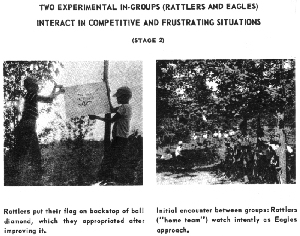
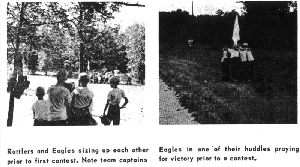
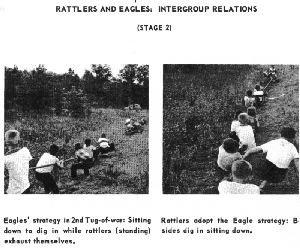
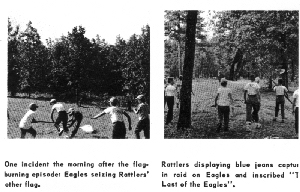
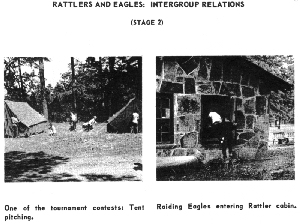
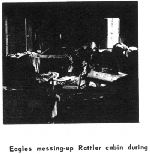
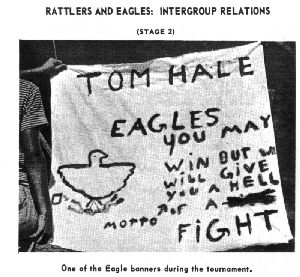
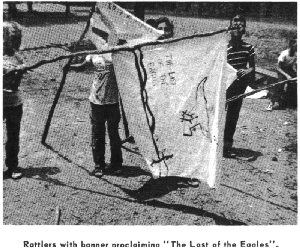
Up to the last day, with the procedure of equalizing scores through the category B events, the scores were fairly close together. The score values were indicated by rising thermometers on the official score chart. The increase in the readings were made with considerable flourish at meals when all boys were [p. 100] present (both groups). This neck-to-neck race in contests continued until the last day of the tournament. The outcome of the tournament hinged on the last event on the afternoon of Day 5 (Stage 2). This last event was the treasure hunt, which, being conducted in the respective camp areas of each group, could be manipulated by the experimenters in a way to insure the transition of two intact group structures to Stage 3, which is the crucial stage of the study. In view of the fact that 2 boys from the Eagle group had been sent home because of homesickness at the end of Stage 1 (see Chapter 4), leaving only 9
boys in that group, there was some danger of disorganization of the Eagles in case of their defeat. More specifically, there might have been a revival of Mason's desire to go home. He had been somewhat affected in this direction during Stage 1, probably through his contact with the two boys who left the group. The fact that we could proceed two days after the end of the tournament to Stage 3 indicated that the decision to tip the scales in favor of the Eagles was sound.
Right after the treasure hunt, the two groups were brought together, each on one side of the exhibit of prizes, and results were announced. The scores received by each group for every event were specified, making the outcome hinge on the treasure hunt. The tournament was declared to have been won by the Eagles through their completion of the treasure hunt in 8
minutes 38 seconds versus 10 minutes 15 seconds for the Rattlers. The Eagles were jubilant at their victory, jumping up and down, hugging each other, making sure in loud tones that everyone present was aware of their victory. On the other hand, the Rattlers were glum, dejected, and remained silently seated on the ground.
The series of contests was the main focus of attention for both groups, manifested in actual physical encounters and practice sessions in preparation for them, in group discussion, in self-justifying and self-glorifying words used in relation to themselves, and invectives and derogatory terms hurled at the out-group in actual encounters and in reference to the out-group in the privacy of the in-group circle. Various contests had differential effects in producing the above attitudinal and behavioral consequences. At least for these 11-year-old boys, the activities which were not too prolonged and which involved direct physical contact were most effective, with the tug-of-war heading the [p. 101] list. The build-up of negative attitudes was cumulative with rapid spurts at times, as determined by the nature of the encounter. Even though the boys hurled invectives starting with the first contest of the tournament, the norms internalized from the larger social setting concerning "good sportsmanship" were clearly evident for the first two days, as revealed through the custom of giving three cheers for the losers.
After the second day of the tournament, the "good sportsmanship" stated in specific words during the initial period and exhibited after the first contests in this series (especially by the Eagles) gave away, as event followed event, to increased name-calling, hurling invectives, and derogation of the out-group to the point that the groups became more and more reluctant to have anything to do with one another. This attitude of not having anything to do with each other was intensified owing to the impact of events taking place after the tournament was over, as we shall see presently.
The first physical encounter of the two groups, their immediate "sizing up" of each other, the explicit expressions of their rapidly developing attitudes toward each other may have significant implications for the systematic study of the rise of rather sharp an in-group and out-group delineation and rapid crystallization of attitudes toward an out-group when the functional relation involved is one of rivalry. Therefore, a description of this very first contact between the two in-groups, which were formed independently of each other, follows: The Rattlers were first at the ballfield (which they considered "ours") as befits the "home team."
The Eagles approached with their flag on a pole singing the menacing notes of the "Dragnet"
theme (See Figure). For a time the two groups looked each other over. Than [sic] an Eagle used a derogatory word, a catcall from a Rattler answered him, and the razzing was on. Before the game started, Mason gave a little lecture to the Eagles on not getting rattled. As the game got underway, the Rattlers sang "The first Eagle hit the deck, parley-voo. . . The second Eagle hit the deck, parley-voo. . ., etc. " Eagles called back at them: "Our pitcher is better than yours;"
"Our catcher is better than yours. " As the game progressed the Rattlers referred to Wilson (E) as Fatty, Tubby, "Little Black Sambo." Myers, the Eagle of such good-will prior to the game, was especially active in calling out at the Rattlers, though Craig tried to hush him with [p. 102]
words about sportsmanship.
Craig's downfall from leadership of the Eagles started during this game. He wanted to pitch when Mason became tired, but Mason put in Wilson, saying later that Craig just wasn't good enough. (In spite of this, Craig rubbed Mason's arm after the game.) As the game continued, the Rattlers called, "You're not Eagles, you're pigeons!" When the game ended with a Rattler victory, the Rattlers put on a display of "good sportsmanship" for the losers. In the Eagle group, Mason threatened to beat up some Eagles if they didn't try harder, but praised Lane (low status) for his improved performance. Craig, who had not made a good showing, carried a Rattler glove left at the field and dropped it in the water near the Eagle cabin.
The two competing groups were together in the mess hall for the first time at lunch on Day 2, after the baseball game. There was considerable name-calling, razzing back and forth, and singing of derogatory songs by each group in turn. Before supper that evening, some Eagles expressed a desire not to eat with the Rattlers.
In saying grace at these first meals together, the members of each group expressed their desire for victory. Myers (E) asked that God help them win the tournament and that He keep them together and not let anyone else get homesick and go home. Allen (R) prayed: "Dear Lord, we thank Thee for the food and for the cooks that cooked it, and for the ball game we won today." In the Eagle group, prayers were said for victory at night, and it became standard practice for that group to huddle in prayer before games (see Figure). Mason (E) attributed their victory in baseball on the following day to this practice.
Before continuing with the tournament events, note should be taken of the behavior of sideline participants in the various contests. Because there were 11 Rattlers and only 9 Eagles, two of the Rattlers could not participate in certain of the contests (e. g., baseball, tug-of-war, etc.).
These non-players were chosen by the group and were always low status members, unless injuries dictated the choice. Since these members were not actually taking part in the competition, their behavior under these [p. 103] circumstances is particularly significant.
At the first baseball game on the occasion of first contact between the groups, Everett (R), who had been chosen as one non-player, was the loudest of the Rattlers in haranguing the Eagles, cursing them roundly and making up a song about Eagles which was supposed to be very insulting. Harrison, the other non-player (because of an injury), arrived after the exchange of insults between groups had already started. Although he had not witnessed the events leading to friction between the groups, and, in fact, before he had exchanged a single word with any camper, he started yelling insults at the Eagles.
There were numerous other incidents of this nature at the other contests, which illustrate the point that actual physical participation is not a necessary condition for involvement and participation in some form by good group members.
The afternoon of the first day was spent by both groups in intensive preparation for other events. The Rattlers had cabin clean-up, practiced for tug-of-war, and washed their shirts which they had decided to wear at every game. Mason delivered a lecture to the Eagles on how to win, and the group practiced at tug-of-war for 45 minutes. Mason had organized a cabin-cleaning detail before lunch, insisting on full participation, although prior to the tournament he himself had shown no interest at al in such chores. Later in the tournament, Mason was to urge his group to practice other activities in which he personally had little interest, such as the skits.
When he felt they were not trying hard enough, his usual procedure was to declare he was going home, even starting out the cabin door. This device was very effective since the Eagles were aware of Mason's value as player and captain, and it therefore resulted in renewed efforts on their part.
The first tug-of-war was held after supper on this first day of the tournament. Simpson (R) was particularly vocal in calling taunts to the Eagles. When the referee called for captains, Mason stepped forward for the Eagles, although he had been elected only as baseball captain, and Simpson stepped forward for the Rattlers. The contest began and the Eagles pulled the first Rattler over the line. At this point, the Rattlers began moving the Eagles and continued doing so until al the Eagles were across the line. When [p. 104] Craig (E) saw the Eagles were losing, he walked away from the rope. The winning Rattlers cheered, jumped, and slapped each other on the back, then gave three cheers for the Eagles (Mills noting, "that shows we are good sports!"). They passed by the dejected Eagles with much yelling and razzing, particularly from Everett who had not even taken part in the tug-of-war. Victory was on every Rattler tongue that night, and the next morning the story of how Brown, their anchor man, had shouted "Yawl come !" and they "just came", was repeated with great appreciation.
After this defeat the downhearted Eagles stood around discussing how big the Rattlers were.
Mason was crying, saying the Rattlers must be at least 8th graders, that he was going home, that he would fight a Rattler the next time they met. (Since the Eagles had lost one of their large boys through homesickness, and the Rattlers did have the largest boy in camp, there was some basis for the Rattlers looking big to the Eagles.) Craig, who was chastised for leaving the rope, said they were beaten already. Myers, Clark and McGraw took an optimistic view of the situation, calling for teamwork and planned tactics. (The next day, as we shall see, the Eagles actually did work out tactics before the tug-of-war which proved highly effective. See below) Finally someone suggested the Eagles go back to their cabin. Lane (low status) started off first and noticed the Rattlers' flag on the ballfield backstop. He yelled that they could take it down.
The Eagles all ran for the backstop, Craig trying to knock down the flag and then climbing up to take it down. Mason grabbed it and tried, with the help of others, to tear it up. Someone suggested: "Let's burn it." So Mason, Craig, and McGraw (who found matches) set the flag on fire. Mason held it while it burned, then they decided to hang the scorched remnant back up.
Craig did so, and the boys sang "Taps." Mason said, "You can tell those guys I did it if they say anything. I'll fight 'em!"
As they walked to their cabin, the Eagles spoke hopefully of how they would beat the Rattlers at basebal the next day. Everyone told how they contributed to the contest, comparing rope burns and aching muscles. As they went











